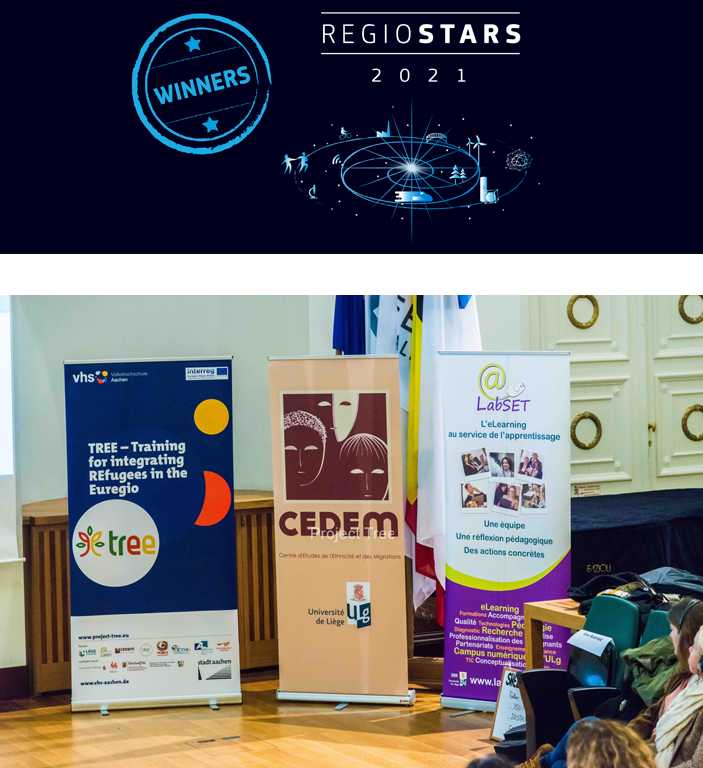Implemented in the Euroregio Meuse-Rhine, which straddles the borders of Belgium, Germany, and the Netherlands, the TREE project aimed to improve integration procedures for refugees and migrants. About 60 people, including social workers, teachers, interpreters, and administrative and medical staff, received training in three areas: development of intercultural communication skills, support for refugees during the integration process, and building personal resilience.
- 10 May 2021
‘The aim of the TREE project is to facilitate the integration of refugees in the Euregio Meuse-Rhine. The partners designed a needs-oriented training programme for practitioners working with refugees and migrants and a qualification programme for social interpreters.’
The training included face-to-face sessions, transfer of newly acquired skills to professional practice and exchange of experience. Participants helped around 600 migrants and refugees via counselling sessions, provision of interpreting services and guidance through integration processes.
In addition, some 80 migrants and refugees were trained as interpreters in the Vulkaneifel district, a rural area of Germany lacking interpretation services, and in an urban area of Namur province, Belgium, where the training strengthened existing services.
Interpretation trainees were guided by qualified interpreters throughout the programme, which consisted of theoretical and practical elements. By putting the newly qualified interpreters in touch with organisations active in the field of integration, TREE enabled them to find work after the end of the project.
TREE held seven dialogue events in the three countries. The events brought together around 200 migrants, refugees and local people to reduce prejudice and foster mutual understanding.
Differing responses to migration
Although most European countries now have a high level of cultural diversity, the arrival of large numbers of refugees from 2015 onwards received mixed responses. On the one hand, initiatives were set up to welcome the newcomers; on the other, refugees were perceived as a threat to society.
It is thus vital to create conditions for the successful integration of migrants – especially asylum seekers – into European society. However, many people involved in integration have not been trained to work with refugees, while others need training in intercultural skills and resilience.
Putting knowledge into practice
TREE began by analysing and comparing integration procedures and requirements in the participating regions to identify training needs. Based on the findings, partners from all three countries designed a programme composed of three modules for people working in a range of sectors.
Participants can follow as many of the modules as they wish. About half of the programme is dedicated to the transfer of knowledge to professional practice, with continuous feedback given. Trainees learn to analyse complex real-life situations and build a portfolio to evaluate their skills development.
The collaboration and pooling of competences between the partners has led to the creation of a sustainable cross-border integration network, along with complementary local and regional networks.
As well as empowering refugees and migrants, development of the interpreting qualification has established professional standards for interpreting in social situations in Germany, where they did not previously exist, and reinforced existing standards in the Walloon Region.
Beneficiaries
'I come from Afghanistan and have been living in Germany for 5 years. With the help of the project, I was able to successfully complete a German language course and driving test. Thanks to the TREE project, I have found a good job.'
Mr Karini
'I am Mauritanian and have been living in Belgium for 7 or 8 years. I have accompanied many of my friends to the hospital, to lawyers or to social workers to translate from Arabic into French, and that's when I thought: shouldn't I professionalise this activity? Thanks to a friend, I discovered Le Monde des Possibles, where I started the TREE training, which has allowed me to practise this work that I love.'
Fatimetou Dicko
Total investment and EU funding
Total investment for the project “TREE – Training for integrating refugees in the Euregio” is EUR 2 108 079, with the EU’s European Regional Development Fund contributing EUR 1 054 040 through the “Interreg V-A – Belgium-Germany-The Netherlands (Euregio Meuse-Rhin/Euregio Maas-Rijn/Euregio Maas-Rhein)” Cooperation Programme for the 2014-2020 programming period.

